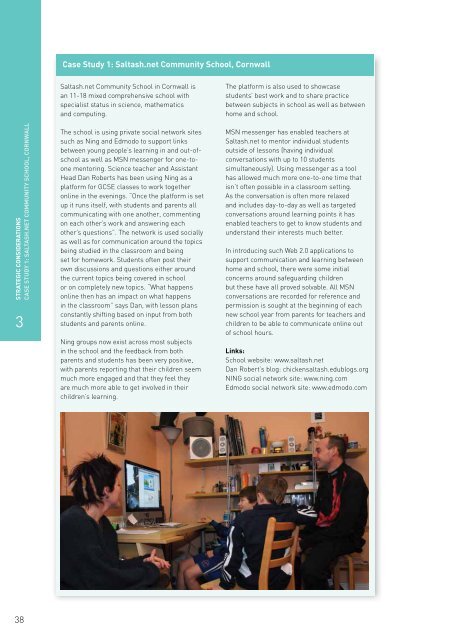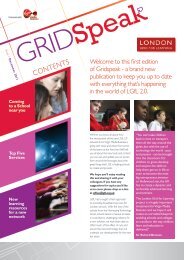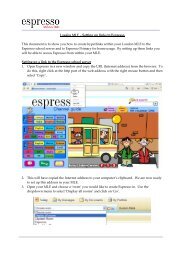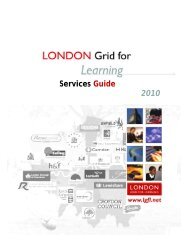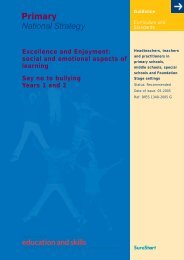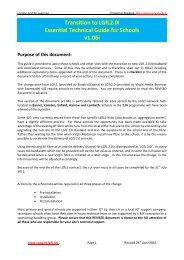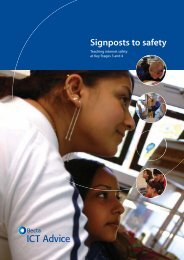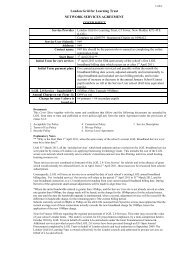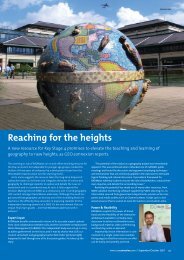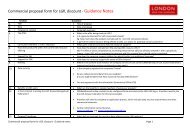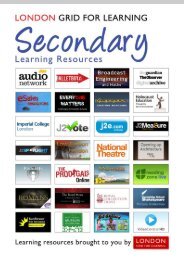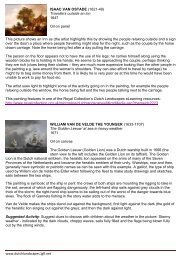Developing the home-school relationship using digital ... - Futurelab
Developing the home-school relationship using digital ... - Futurelab
Developing the home-school relationship using digital ... - Futurelab
- No tags were found...
Create successful ePaper yourself
Turn your PDF publications into a flip-book with our unique Google optimized e-Paper software.
Case Study 1: Saltash.net Community School, CornwallSaltash.net Community School in Cornwall isan 11-18 mixed comprehensive <strong>school</strong> withspecialist status in science, ma<strong>the</strong>maticsand computing.The platform is also used to showcasestudents’ best work and to share practicebetween subjects in <strong>school</strong> as well as between<strong>home</strong> and <strong>school</strong>.STRATEGIC CONSIDERATIONSCASE STUDY 1: SALTASH.NET COMMUNITY SCHOOL, CORNWALL3The <strong>school</strong> is <strong>using</strong> private social network sitessuch as Ning and Edmodo to support linksbetween young people’s learning in and out-of<strong>school</strong>as well as MSN messenger for one-toonementoring. Science teacher and AssistantHead Dan Roberts has been <strong>using</strong> Ning as aplatform for GCSE classes to work toge<strong>the</strong>ronline in <strong>the</strong> evenings. “Once <strong>the</strong> platform is setup it runs itself, with students and parents allcommunicating with one ano<strong>the</strong>r, commentingon each o<strong>the</strong>r’s work and answering eacho<strong>the</strong>r’s questions”. The network is used sociallyas well as for communication around <strong>the</strong> topicsbeing studied in <strong>the</strong> classroom and beingset for <strong>home</strong>work. Students often post <strong>the</strong>irown discussions and questions ei<strong>the</strong>r around<strong>the</strong> current topics being covered in <strong>school</strong>or on completely new topics. “What happensonline <strong>the</strong>n has an impact on what happensin <strong>the</strong> classroom” says Dan, with lesson plansconstantly shifting based on input from bothstudents and parents online.Ning groups now exist across most subjectsin <strong>the</strong> <strong>school</strong> and <strong>the</strong> feedback from bothparents and students has been very positive,with parents reporting that <strong>the</strong>ir children seemmuch more engaged and that <strong>the</strong>y feel <strong>the</strong>yare much more able to get involved in <strong>the</strong>irchildren’s learning.MSN messenger has enabled teachers atSaltash.net to mentor individual studentsoutside of lessons (having individualconversations with up to 10 studentssimultaneously). Using messenger as a toolhas allowed much more one-to-one time thatisn’t often possible in a classroom setting.As <strong>the</strong> conversation is often more relaxedand includes day-to-day as well as targetedconversations around learning points it hasenabled teachers to get to know students andunderstand <strong>the</strong>ir interests much better.In introducing such Web 2.0 applications tosupport communication and learning between<strong>home</strong> and <strong>school</strong>, <strong>the</strong>re were some initialconcerns around safeguarding childrenbut <strong>the</strong>se have all proved solvable. All MSNconversations are recorded for reference andpermission is sought at <strong>the</strong> beginning of eachnew <strong>school</strong> year from parents for teachers andchildren to be able to communicate online outof <strong>school</strong> hours.Links:School website: www.saltash.netDan Robert’s blog: chickensaltash.edublogs.orgNING social network site: www.ning.comEdmodo social network site: www.edmodo.com38


